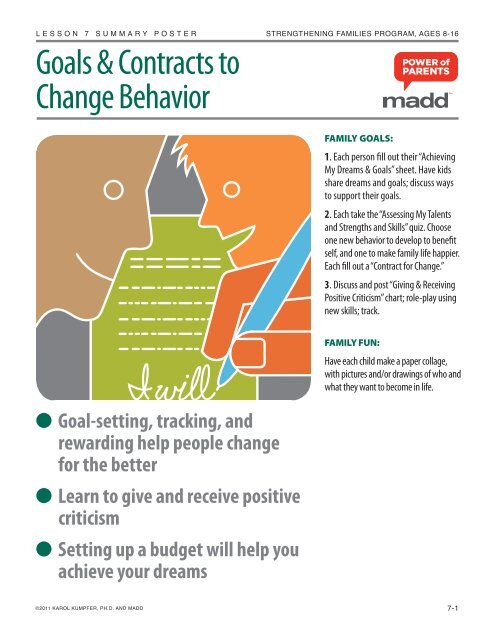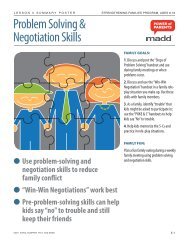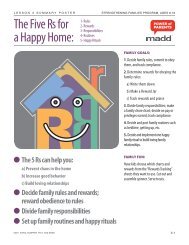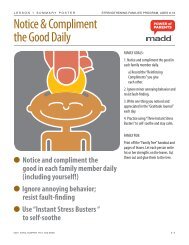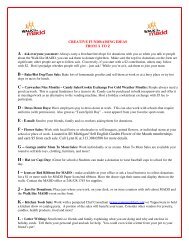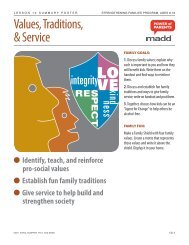Goals & Contracts to Change Behavior - MADD
Goals & Contracts to Change Behavior - MADD
Goals & Contracts to Change Behavior - MADD
You also want an ePaper? Increase the reach of your titles
YUMPU automatically turns print PDFs into web optimized ePapers that Google loves.
LESSON 7 SUMMARY POSTER STRENGTHENING FAMILIES PROGRAM, AGES 8-16<br />
<strong>Goals</strong> & <strong>Contracts</strong> <strong>to</strong><br />
<strong>Change</strong> <strong>Behavior</strong><br />
FAMILY GOALS:<br />
1. Each person fill out their “Achieving<br />
My Dreams & <strong>Goals</strong>” sheet. Have kids<br />
share dreams and goals; discuss ways<br />
<strong>to</strong> support their goals.<br />
2. Each take the “Assessing My Talents<br />
and Strengths and Skills” quiz. Choose<br />
one new behavior <strong>to</strong> develop <strong>to</strong> benefit<br />
self, and one <strong>to</strong> make family life happier.<br />
Each fill out a “Contract for <strong>Change</strong>.”<br />
3. Discuss and post “Giving & Receiving<br />
Positive Criticism” chart; role-play using<br />
new skills; track.<br />
l Goal-setting, tracking, and<br />
rewarding help people change<br />
for the better<br />
l Learn <strong>to</strong> give and receive positive<br />
criticism<br />
l Setting up a budget will help you<br />
achieve your dreams<br />
FAMILY FUN:<br />
Have each child make a paper collage,<br />
with pictures and/or drawings of who and<br />
what they want <strong>to</strong> become in life.<br />
©2011 KAROL KUMPFER, PH.D. AND <strong>MADD</strong> 7-1
LESSON 7<br />
Achieving My <strong>Goals</strong> and Dreams<br />
Read each morning <strong>to</strong> remember what I want most in life*<br />
STRENGTHENING FAMILIES PROGRAM, AGES 8-16<br />
Think about and write down what you want most in each area of your life. Then decide what you need <strong>to</strong> do <strong>to</strong> get there, and what skills you need <strong>to</strong> develop<br />
<strong>to</strong> make it happen. Then use the “S.M.A.R.T. <strong>Goals</strong> Tracking Sheet” <strong>to</strong> set up short weekly goals <strong>to</strong> develop the needed skills and do the actions <strong>to</strong> make your<br />
goals and dreams reality. *Adapted from Dr. Daniel Amen’s “One Page Miracle” sheet.<br />
Remember: “Don’t trade what you want at the moment for what you want long-term.”<br />
MY GOALS<br />
Relationships School and Work Physical Health<br />
Actions <strong>to</strong> Take: Actions <strong>to</strong> Take: Actions <strong>to</strong> Take:<br />
Skills <strong>to</strong> Develop: Skills <strong>to</strong> Develop: Skills <strong>to</strong> Develop:<br />
Emotional/Spiritual Health Financial Other<br />
Actions <strong>to</strong> Take: Actions <strong>to</strong> Take: Actions <strong>to</strong> Take:<br />
Skills <strong>to</strong> Develop: Skills <strong>to</strong> Develop: Skills <strong>to</strong> Develop:<br />
“Teens, through their choices and actions, have the power <strong>to</strong> direct the development of their own brains….[They are] laying the neural<br />
foundations that will serve them for the rest of their lives.”<br />
- Dr. Jay Giedd, MD, Chief of Brain Imaging, National Institutes of Mental Health (NIMH)<br />
©2011 KAROL KUMPFER, PH.D. AND <strong>MADD</strong> 7-2
LESSON 7<br />
Assessing Strengths and Skills<br />
Choosing pro-social attitudes and skills wires your brain for success<br />
STRENGTHENING FAMILIES PROGRAM, AGES 8-16<br />
Below, grouped by area of Intelligence, are pro-social attitudes and skills that enable us <strong>to</strong> fulfill our life’s goals and make a positive contribution <strong>to</strong> society. Because the<br />
brain has the amazing ability <strong>to</strong> adapt and change its physical structure though our choices we can increase our intelligence in each area through “Positive Practice.”<br />
HOW: Each person ranks self [ 0-<strong>to</strong>-5 ] in each category. Then choose one skill <strong>to</strong> develop that would benefit self, and one that would help make your family life<br />
happier. If you see a weak area, choose its Positive Opposite, make a S.M.A.R.T. goal and fill out a “Contract <strong>to</strong> <strong>Change</strong>.” Then track and reward your performance.<br />
Emotional Intelligence<br />
Self-awareness of feelings, needs, motivation;<br />
expresses self kindly<br />
Moderates moods, responses<br />
Self-moni<strong>to</strong>ring: aware of own behavior’s<br />
impact on others<br />
Impulse control: appropriately s<strong>to</strong>pping behavior<br />
at proper time<br />
Emotional control: chooses pro-social responses<br />
<strong>to</strong> stressors<br />
Not explosive, easily upset; or give huge<br />
response <strong>to</strong> small annoyance<br />
Social awareness: notices body-language of others;<br />
can accurately pick up on emotions of others<br />
Feels empathy for others’ needs<br />
Keeps self-talk accurate, positive<br />
Gracious; knows how <strong>to</strong> make others feel<br />
comfortable<br />
Patient, can wait without anger<br />
Notices, is grateful for small things<br />
IQ = Standard Intelligence<br />
Working memory: remembers, holds information<br />
in mind <strong>to</strong> complete a specific task<br />
Mental flexibility; shifts attention from one<br />
aspect of a problem <strong>to</strong> another; doesn’t get stuck<br />
Notices connections; able <strong>to</strong> extrapolate, make<br />
deductions<br />
Abstract problem solving ability<br />
Good logical reasoning; ponders deep questions<br />
Good problem-solving skills<br />
Makes good decisions<br />
Sees innovative solutions<br />
Reads extensively, studies math, science,<br />
literature <strong>to</strong> increase knowledge and intelligence<br />
Practical Intelligence<br />
Plan, think ahead; anticipate needs, possible<br />
problems; set goals, find ways <strong>to</strong> fulfill them<br />
Weighs personal decisions carefully before<br />
deciding<br />
Organize time <strong>to</strong> systematically do needed<br />
tasks; not wait <strong>to</strong> last minute; handles complex<br />
tasks<br />
Organize surroundings so things are orderly<br />
and accessible<br />
Self-start: begin tasks or activity without being<br />
reminded<br />
Focused and on-task; ignores distractions<br />
Moni<strong>to</strong>rs tasks: check work for mistakes; assure<br />
accuracy<br />
Budget & spend money wisely<br />
Responsible, dependable: takes ownership of<br />
task, completes it.<br />
Persistence—doesn’t give up in face of<br />
obstacles or difficulties<br />
Moral Intelligence<br />
Adopts core pro-social values<br />
Develops conscience, a strong inner voice that<br />
helps us know right from wrong<br />
Committed <strong>to</strong> choose right<br />
Reflective: compares actions with values and<br />
corrects actions<br />
Humble; values others as equal<br />
Respects others’ rights<br />
Law abiding; obeys rules that are “just”<br />
Kind; generous <strong>to</strong> others<br />
Fair; values win-win negotiation<br />
Intentionally honest; doesn’t lie, cheat, or steal in<br />
any way<br />
Appreciates and respects diversity<br />
Admits mistakes; rectifies them<br />
Values socially responsible sex (i.e. that bonds<br />
spouses; doesn’t spread disease, exploit women or<br />
children, or produce children out of marriage)<br />
Skills I will work on<br />
Talents and Gifts<br />
Artistic<br />
Dance ability<br />
Sports/ athletics<br />
Good wit, sense of humor<br />
Musical<br />
Good cook<br />
Happy, cheerful, friendly<br />
Loving <strong>to</strong> others<br />
Public speaking<br />
Good communication skills<br />
Good at fixing things<br />
Adept at electronics<br />
Inventive<br />
Hard worker<br />
Drama, acting ability<br />
Organizer; intuitively sense which people<br />
work well <strong>to</strong>gether<br />
Event planner<br />
©2011 KAROL KUMPFER, PH.D. AND <strong>MADD</strong> 7-3
LESSON 7<br />
Making S.M.A.R.T. <strong>Goals</strong><br />
(S)pecific; (M)easurable; (A)chievable-in-steps; (R)ewarding; (T)ime-specific<br />
STRENGTHENING FAMILIES PROGRAM, AGES 8-16<br />
S.M.A.R.T. goals was a mnemonic term coined by George Doran. The letters can mean many different words. We prefer “Specific, Measurable, Achievablein-steps,<br />
Rewarding, and Time-specific.” Use the spaces below, and the “<strong>Contracts</strong> for <strong>Change</strong>,” <strong>to</strong> help your child set S.M.A.R.T. goals. Here’s an example of<br />
what each means. The goal is for Billy <strong>to</strong> clean his room each Saturday.<br />
• Specific (Details of what it entails) i.e. Bed made, clothes put away, floor vacuumed, furniture dusted<br />
• Measurable (What will I measure; how will I tell how I am doing?) i.e. Check off chore description<br />
• Achievable-in-steps (What steps will it take?) i.e. Teach <strong>to</strong> make bed; make a set place for things; train <strong>to</strong> vacuum and dust<br />
• Rewarding-Reporting (What rewards will I get when completing my goal?) i.e. $3.00<br />
• Time-specific (What are the deadlines for doing each step?) i.e. By noon on Saturday<br />
S.M.A.R.T. GOAL 1<br />
GOAL:<br />
Specific<br />
Measurable<br />
Achievable-in-steps<br />
Rewarding<br />
Time-specific<br />
S.M.A.R.T. GOAL 2<br />
GOAL:<br />
Specific<br />
Measurable<br />
Achievable-in-steps<br />
Rewarding<br />
Time-specific<br />
S.M.A.R.T. GOAL 3<br />
GOAL:<br />
Specific<br />
Measurable<br />
Achievable-in-steps<br />
Rewarding<br />
Time-specific<br />
©2011 KAROL KUMPFER, PH.D. AND <strong>MADD</strong> 7-4
LESSON 7<br />
Contract For <strong>Change</strong><br />
Making agreements for a positive change<br />
STRENGTHENING FAMILIES PROGRAM, AGES 8-16<br />
Choosing the “Positive Opposite” of a negative behavior, and making a “Contract for <strong>Change</strong>,” is a great way <strong>to</strong> improve not only your character, but the quality of your<br />
whole life. <strong>Change</strong> is the way <strong>to</strong> become happier and achieve what is most important <strong>to</strong> you. Just as we admire a shiny new car, and would change an old battered<br />
car in for a new one any day, getting a shiny new character and acquiring pro-social skills is even more important for happiness. So give this “Contract for <strong>Change</strong>” a<br />
chance. You’re signing up for a better, happier life. Make sure you prepare first by following the “Tips <strong>to</strong> Achieve Success” and use the four-week tracking sheet.<br />
CONTRACT FOR CHANGE<br />
Tips <strong>to</strong> Achieve<br />
Success<br />
Name<br />
The negative behavior I want <strong>to</strong> change is<br />
The positive behavior I will do instead is<br />
That means<br />
Date<br />
1) Feel a personal motivation<br />
<strong>to</strong> change. (Establish<br />
rewards you care about; think<br />
how the behavior is harmful,<br />
has negative consequences,<br />
and violates your values.)<br />
2) Do “Positive Practice”<br />
of the new behavior.<br />
(Practice role-plays until it’s<br />
easy <strong>to</strong> do.)<br />
Reminders I will give myself are<br />
I will track it using the following method<br />
Rewards I will earn for adopting this positive behavior are<br />
3) Set-up your environment<br />
for success. (Make<br />
it easy <strong>to</strong> do; make plans<br />
<strong>to</strong> stay away from bad<br />
influences.)<br />
4) Set a specific time <strong>to</strong><br />
report progress. (Weekly<br />
Pleasant Personal Conference.)<br />
Consequences if I don’t comply are<br />
Teen’s Signature<br />
Parent’s Signature<br />
Date<br />
Date<br />
5) Make it socially rewarding.<br />
(Ask family <strong>to</strong> notice<br />
and compliment your new<br />
good behavior.)<br />
TRACKING MY PROGRESS<br />
WEEK<br />
MONDAY TUESDAY WEDNESDAY THURSDAY FRIDAY SATURDAY SUNDAY<br />
1<br />
2<br />
3<br />
4<br />
©2011 KAROL KUMPFER, PH.D. AND <strong>MADD</strong> 7-5
LESSON 7<br />
Helping Kids <strong>Change</strong> for the Better<br />
Practice better skills <strong>to</strong> confront and help change negative behavior<br />
STRENGTHENING FAMILIES PROGRAM, AGES 8-16<br />
BEFORE YOU BEGIN ask yourself these five questions: (If the answer is yes <strong>to</strong> all of them, then proceed in a kindly manner.)<br />
1) Is it my responsibility <strong>to</strong> give this person feedback? 2) Is the criticism true? 3) Is the criticism necessary? 4) Have I thought of several positive things<br />
about the person that I can also share with him or her? 5) Did I ask for and receive permission <strong>to</strong> criticize? (Ex: “I noticed some things that seem <strong>to</strong> be negatively<br />
affecting your life / our family/ our relationship, and would like <strong>to</strong> talk with you about it. Would that be okay?”)<br />
How <strong>to</strong> Give Positive Criticism<br />
1. Feel genuine respect and concern for the person.<br />
2. Pick a good time. (Don’t criticize when someone is angry<br />
or upset.)<br />
3. Pick a good place. (Usually quiet, and away from other<br />
people.)<br />
4. Have a pleasant face and calm voice.<br />
5. Say what you like about the person first.<br />
6. Ask if the person has noticed the problem .<br />
7. Describe how the problem affects others or is negatively<br />
affecting the person’s life.<br />
8. Ask what he/ she thinks the solution might be.<br />
9. Offer your own solution if needed; ask if he/she will do it.<br />
Write up a “Contract for <strong>Change</strong>.”<br />
10. Thank person for listening; express love.<br />
Tips for Delivering Difficult Feedback<br />
PREPARE:<br />
a) Remember <strong>to</strong> protect the<br />
relationship.<br />
b) Sit side by side (like partners,<br />
on same team).<br />
c) Look AT THE PERSON while<br />
giving all positive comments.<br />
d) Look STRAIGHT IN FRONT OF<br />
YOU when describing the<br />
problem or giving negative<br />
comments.<br />
Consider the “problem” you want<br />
<strong>to</strong> discuss as an imaginary object<br />
in front of you; point at it several<br />
times <strong>to</strong> focus negative energy<br />
BEGIN:<br />
HELPFUL TIP<br />
1. Begin by saying what you like<br />
about the person.<br />
2. Describe the problem as you<br />
see it.<br />
3. Ask what happened.<br />
4. Ask what the person will do <strong>to</strong><br />
behave differently (next time).<br />
5. End by saying something<br />
positive about the person.<br />
there as you talk. Or look at and<br />
point <strong>to</strong> a notebook in your lap on<br />
which you have a couple of words<br />
describing the problem.<br />
Motivational Interviewing<br />
1. Express empathy for the person’s problem, concern, or point<br />
of view.<br />
2. Point out inconsistencies between the person’s values and<br />
current behavior.<br />
3. Validate the reluctance <strong>to</strong> change as natural; but not<br />
beneficial <strong>to</strong> him/her.<br />
4. Express confidence in the person’s ability <strong>to</strong> change.<br />
5. Ask what he or she is willing <strong>to</strong> do differently.<br />
6. Ask for a commitment <strong>to</strong> do it. If willing, help the person fill<br />
out a “Contract for <strong>Change</strong>.”<br />
(Before filling out the Contract, help prepare for person’s<br />
success—see box at right.)<br />
“Contract for <strong>Change</strong>” – Prepare First<br />
1) Create personal motivation <strong>to</strong> change. (Describe how behavior<br />
is harmful; appeal <strong>to</strong> personal honor; establish Rewards; discuss<br />
negative consequences.)<br />
2) Do “Positive Practice” of new behavior. (Practice in a role-play<br />
setting until it’s easy <strong>to</strong> do.)<br />
3) Set-up environment for success. (Ex: step s<strong>to</strong>ol for child <strong>to</strong> put<br />
away dishes, labeled drawers, reminders.)<br />
4) Set a specific time <strong>to</strong> report progress. (Weekly Pleasant Personal<br />
Conference.)<br />
5) Make it socially rewarding. (Ex: remind family <strong>to</strong> notice and<br />
praise the good behavior.)<br />
©2011 KAROL KUMPFER, PH.D. AND <strong>MADD</strong> 7-6
LESSON 7<br />
Time Master—Achieving Your <strong>Goals</strong><br />
Copy and use this sheet daily <strong>to</strong> use your time more effectively<br />
STRENGTHENING FAMILIES PROGRAM, AGES 8-16<br />
Teach children time management skills by helping them fill out this sheet and track how they use their time: 1) Decide what needs <strong>to</strong> be done;<br />
2) List priority/ importance of each; 3) Give each a realistic time limit; 4) Divide large projects in<strong>to</strong> small steps; 5) Assign a time <strong>to</strong> do each thing;<br />
6) Strive for balance; 7) Do most important things first; 8) Avoid procrastination; 9) Stay on task; 10) Evaluate nightly; plan for <strong>to</strong>morrow.<br />
What matters<br />
most? A, B, C<br />
Stuff <strong>to</strong> Do<br />
How long<br />
will it take?<br />
What’s Going On When<br />
On<br />
Task?<br />
PROJECT:<br />
STEPS:<br />
1.<br />
2.<br />
3.<br />
4.<br />
5.<br />
6.<br />
1.<br />
2.<br />
3.<br />
4.<br />
5.<br />
6.<br />
7.<br />
8.<br />
9.<br />
10.<br />
Project-Planning<br />
DUE<br />
DATE<br />
6:00 a.m.<br />
6:30<br />
7:00<br />
7:30<br />
8.00<br />
8:30<br />
9:00<br />
9:30<br />
10:00<br />
10:30<br />
11:00<br />
11:30<br />
12:00 p.m.<br />
12:30<br />
1:00<br />
1:30<br />
2:00<br />
2:30<br />
3:00<br />
3:30<br />
4:00<br />
4:30<br />
5:00<br />
5:30<br />
6:00<br />
6:30<br />
7:00<br />
7:30<br />
8:00<br />
8:30<br />
9:00<br />
9:30<br />
10:00<br />
Having Trouble Getting Going? Try These Procrastination Busters:<br />
Before you begin, do this:<br />
• Prepare a plan—write what <strong>to</strong> do when<br />
• Pick a “Power-Work” time and a set place<br />
• Prepare a production “pile” (all materials needed)<br />
• Pick rewards (short & long term) for completion<br />
When it’s time <strong>to</strong> work, do this:<br />
• Pump up your psyche with positive self-talk<br />
• Pump up your brain blood-flow with exercise<br />
• Smile and <strong>to</strong>uch the pile<br />
• Pick up a pencil and work for ten minutes<br />
©2011 KAROL KUMPFER, PH.D. AND <strong>MADD</strong> 7-7
LESSON 7<br />
Tips for School Success<br />
Skills <strong>to</strong> help your kids achieve success in school<br />
STRENGTHENING FAMILIES PROGRAM, AGES 8-16<br />
A child’s primary “job” growing up is <strong>to</strong> get a good education and acquire attitudes and skills <strong>to</strong> contribute <strong>to</strong> society and become a thoughtful, responsible<br />
adult. Kids need <strong>to</strong> take their “job” of becoming well-educated seriously. Parents can help kids by emphasizing the exciting nature of learning<br />
new skills that wire their brains for success. The more kids learn in one area, the smarter their brain becomes over-all. Teach kids that their brain loves a<br />
challenge and they can learn even difficult material if they try different learning strategies and practice more. (For learning tips see: “Rediscover the Joy<br />
of Learning” by Dr. Don Blackerby. For tips on brainpower see research by Dr. Carol Dweck.)<br />
Prepare For Success During School After School<br />
1. Care properly for your brain: Your brain is a<br />
biochemical “computer” that can do amazing<br />
things if you feed it, exercise it, and rest<br />
it well. Eat a nourishing breakfast of whole<br />
grains and protein (eggs or cottage cheese,<br />
etc). Avoid high sugar cereals and high fat<br />
food. Drink water <strong>to</strong> hydrate your brain<br />
and take a fish oil/Omega 3 supplement<br />
and multi-vitamin. Do some aerobic exercise<br />
(minimum of eight <strong>to</strong> twelve minutes)<br />
every morning <strong>to</strong> increase blood flow <strong>to</strong><br />
the brain. Get enough restful sleep. Your<br />
brain puts the things you learned in the<br />
day in<strong>to</strong> long-term memory during sleep.<br />
2. Have a good attitude about school and<br />
your ability <strong>to</strong> learn. Keep your self-talk<br />
positive.<br />
3. Be persistent. Don’t give up. When faced<br />
with difficulty, you just need two things: a<br />
better strategy and more practice<br />
4. Know your learning style (ways and<br />
times you learn best). Use all three:<br />
Visual learners take notes, make outlines,<br />
view drawings in texts. Audi<strong>to</strong>ry: read<br />
material aloud, listen <strong>to</strong> books on tape;<br />
have someone read <strong>to</strong> you. Kinesthetic or<br />
body-motion: do jumping jacks, jump rope<br />
etc. while reciting facts <strong>to</strong> remember.<br />
1. Don’t skip class or make excuses<br />
why you don’t need <strong>to</strong> go. You do.<br />
2. Make the most of your time at<br />
school by getting <strong>to</strong> class on time.<br />
Listen intently, and take good<br />
notes. Have a system for note taking<br />
so you can find them later: (Ex:<br />
a spiral notebook for each subject).<br />
Pre-made outline notebooks exist<br />
for this, or you can make your own.<br />
3. Sit as close <strong>to</strong> the front as possible.<br />
Move from people who distract<br />
you with chatter or notes.<br />
4. Get an assignment notebook or<br />
planner and write all homework<br />
assignments and tests in it as soon<br />
as you get them.<br />
5. Get ready for class by skimming over<br />
the next day’s material the night<br />
before so you can make comments<br />
and ask good questions in class.<br />
6. Form study groups with smart<br />
students who do their homework.<br />
(Look online for tips of<br />
how <strong>to</strong> do it.)<br />
7. Be very polite, friendly, wellgroomed,<br />
and act interested in class<br />
so the teacher will want <strong>to</strong> help you.<br />
1. Make a routine <strong>to</strong> study in the same place and time<br />
each day and do it.<br />
2. Make study time <strong>to</strong>tally distraction free—no IMs,<br />
texts, or phone calls.<br />
3. Use a color-coded notebook system so things are<br />
easy <strong>to</strong> find. Put finished homework in<strong>to</strong> backpack<br />
or book bag as soon as you finish them.<br />
4. Start early in the afternoon so you have plenty of<br />
time <strong>to</strong> finish before bed.<br />
5. Use a “Time Master” sheet <strong>to</strong> block out when you<br />
will study each subject.<br />
6. Eat brain-healthy snacks and drink water: no<br />
junk food.<br />
7. Have it quiet or listen <strong>to</strong> classical music (look-up<br />
the Mozart Effect).<br />
8. Work on most difficult subject first.<br />
9. Take a five-minute break every hour and do some<br />
fast exercises (like jumping jacks, fast dance<br />
moves) <strong>to</strong> bring blood flow <strong>to</strong> the brain.<br />
9. Use “Procrastination Busters” on the “Time Master.”<br />
Find a method for keeping on focus. (Some snap<br />
wrist with rubber band each time they’re off focus!)<br />
10. Reward yourself for staying focused and completing<br />
all your homework.<br />
11. Use “Time Master” sheets <strong>to</strong> break up your long<br />
projects and term papers in<strong>to</strong> smaller assignments.<br />
Start them early, so you have time <strong>to</strong><br />
revise and edit.<br />
Tips for Successful Test-Taking<br />
Mark the test date on your calendar as soon as you know it and begin studying days ahead. Make a study plan of what <strong>to</strong> study when and use a “Time Master”<br />
sheet <strong>to</strong> break down “things <strong>to</strong> study” in<strong>to</strong> specific blocks of time. Ask your teacher what material or chapters will be covered on the test. Use 3 x 5 inch note<br />
cards <strong>to</strong> write important facts and formulas, and review them often. Make word associations (acrostics) <strong>to</strong> help you remember things. Take practice tests from<br />
your book or teacher. Use colored markers <strong>to</strong> highlight points in your notes. Have someone quiz you. Before the test get a good night’s sleep; eat a good breakfast<br />
that includes protein; and drink a glass of water so your brain is hydrated and has fuel. During the test read all the test instructions carefully first. Answer<br />
multiple choice questions in your head; then find answer that is closest. Use positive self-talk; deal with test anxiety using stress reducers.<br />
©2011 KAROL KUMPFER, PH.D. AND <strong>MADD</strong> 7-8
LESSON 7<br />
Budget & Tracking Sheet<br />
Simple forms <strong>to</strong> help your kids learn valuable financial skills<br />
STRENGTHENING FAMILIES PROGRAM, AGES 8-16<br />
A budget is a plan-spending <strong>to</strong>ol <strong>to</strong> help you decide in advance how <strong>to</strong> spend your money. Making and living by a budget can help you stretch your money<br />
further, save for the things you really want, and give you peace of mind. Help children learn the skill of budgeting by planning and tracking what they earn<br />
and spend. As they grow older, let them help plan and track family household spending so they get used <strong>to</strong> living by a budget.<br />
In the family box below, write down “Fixed” expenses that don’t vary much in the box on the left. Put an X by each expense as you pay it. In the <strong>to</strong>p shaded<br />
line, write the amount you will spend in each “Variable” category that you have more control over. Whenever you spend any money in the Variable category,<br />
write it in the white box and subtract from the amount you have left in that category. When you reach “zero” in the category, s<strong>to</strong>p spending.<br />
FAMILY TRACK-SPENDING CARD for MONTH: (INCOME:$ )<br />
F I X E D B I L L S<br />
Food Au<strong>to</strong> gas<br />
& repairs<br />
Clothes<br />
Personal<br />
What? Fun What? Other What?<br />
X Mark when paid Amount $ $ $ $ $<br />
Housing<br />
Au<strong>to</strong> payment<br />
Electricity<br />
Heating<br />
Water<br />
Phone<br />
Cell phone<br />
Internet<br />
Insurance<br />
Medical<br />
Education<br />
Savings<br />
Charities<br />
Pay:<br />
Pay:<br />
TOTAL $ $ $ $ what? $ what? $ what?<br />
(this column)<br />
KIDS’ BUDGET TRACKING CARD for MONTH: (INCOME:$ )<br />
Food Toys gifts Clothes What? Fun What? Other What?<br />
THINGS I’M SAVING FOR<br />
& treats & games Personal<br />
X Mark when paid Amount $ $ $ $<br />
TOTAL $ $ $ $ what? $ what? $ what?<br />
(this column)<br />
©2011 KAROL KUMPFER, PH.D. AND <strong>MADD</strong> 7-9
LESSON 7 STRENGTHENING FAMILIES PROGRAM, AGES 8-16<br />
Pro-Social Skills for a Successful Life<br />
Help kids change for the better<br />
These skills will help your child in life and at school. Be sure <strong>to</strong> role-play them <strong>to</strong>gether several times using different scenarios until they come naturally.<br />
`<br />
HOW TO<br />
DEVELOP<br />
IMPULSE CONTROL<br />
1. Think deeply about what you want most in life.<br />
2. Fill out the “Achieving My <strong>Goals</strong> & Dreams” sheet.<br />
3. Read your “<strong>Goals</strong>” sheet each morning.<br />
4. Be aware when you get distracted or tempted <strong>to</strong><br />
vary from your goal.<br />
5. Practice “Mind-Switching” <strong>to</strong> bring your thoughts <strong>to</strong><br />
what you want most.<br />
HOW TO<br />
DEVELOP<br />
A POSITIVE NATURE<br />
1. Recognize that life has both good and difficult parts,<br />
and that our brains grow and become more<br />
capable by solving problems.<br />
2. Look for a positive benefit in each difficult situation.<br />
3. Daily smile and say positive things <strong>to</strong> yourself and<br />
others, even if you don’t feel like it at first.<br />
4. Look for three small things <strong>to</strong> feel grateful for each<br />
day and write them in a journal.<br />
HOW TO<br />
DEVELOP<br />
PERSISTENCE<br />
1. Decide what you want <strong>to</strong> do and write down why it<br />
is important <strong>to</strong> you.<br />
2. List the steps you will take <strong>to</strong> achieve it.<br />
3. Mentally envision yourself doing each step; then begin.<br />
4. Daily encourage yourself <strong>to</strong> be brave and <strong>to</strong>ugh and<br />
not give up.<br />
5. During each step of the way, congratulate yourself<br />
for not giving up.<br />
HOW TO<br />
ASK<br />
FOR HELP<br />
1. Raise your hand or stand near the person.<br />
2. Ask if the person has time <strong>to</strong> help you now. If not,<br />
ask for a later time.<br />
3. Describe the problem or need clearly.<br />
4. Thank the person for helping you.<br />
©2011 KAROL KUMPFER, PH.D. AND <strong>MADD</strong> 7-10
LESSON 7<br />
Role-Play Slips<br />
Learning by doing<br />
STRENGTHENING FAMILIES PROGRAM, AGES 8-16<br />
PARENT: Your son or daughter has been putting<br />
off his or her term papers until the last minute,<br />
and then has <strong>to</strong> stay up all night <strong>to</strong> finish. Use<br />
“Positive Criticism” <strong>to</strong> help him or her find a<br />
solution <strong>to</strong> change behavior.<br />
WHAT: Role-playing is a form of kinesthetic learning. This means that learning takes place by the student actually doing<br />
a physical activity, rather than listening <strong>to</strong> a lecture or simply watching a demonstration. It helps wire new, positive<br />
behaviors in the brain.<br />
HOW: 2 or more family members pick a “situation” slip and pretend <strong>to</strong> be those persons—portraying what they<br />
would actually do in that particular situation if they were those people. The other family member responds using the<br />
newly learned skills. Start out with easy, fun things, and then add slips that you wrote up using some of your own<br />
family situations. Watch how they do in real life. If they have trouble with the skill, it just means they need an attitude<br />
switch (<strong>to</strong> believe the skill benefits them), more role-play practice sessions and rewards, and more Positive Practice<br />
and negative consequences when they don’t.(See Lessons 3, 4, and 7.) Use these role-play strips or make up your own.<br />
SKILL: Giving Positive Criticism SKILL: SKILL:<br />
PARENT: Your child drops all the clothing he<br />
takes off on the floor and doesn’t pick it up.<br />
Use “Positive Criticism” <strong>to</strong> help him find new<br />
behaviors.<br />
KID: Your parent habitually picks you up late<br />
from after-school practices, causing you<br />
anxiety.<br />
©2011 KAROL KUMPFER, PH.D. AND <strong>MADD</strong> 7-11


